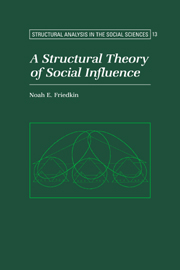7 - Social Positions
Published online by Cambridge University Press: 23 December 2009
Summary
Abstract: A measure of structural equivalence is the third pillar of my approach to the social-influence process. I equate the distance between actors in social space and their structural equivalence in the network of interpersonal influences. This correspondence permits an empirical approach to social positions, and it invests the derived positions with important theoretical properties. I discuss this approach to social positions, and I assess the construct validity of the derived positions. I introduce the concept of social manifolds, which are objects in the multidimensional space of social positions.
An actor's social position is defined by variables that determine the actor's opinions in a domain of issues. The variables may include socioeconomic characteristics (gender, ethnicity, education, income, occupation), material conditions (economy, demography, ecology), and cultural items (beliefs, norms, rules); the variables also may include opinions of significant others. The former set of variables describe exogenous effects on opinions and determine actors' initial opinions, as in Eq. (2.1). The latter set of variables describe endogenous effects on opinions, i.e., the response of actors to the opinions of others, as in Eq. (2.2). The different social positions of actors are based on individual differences in actors' profiles of exogenous status characteristics (X) or endogenous interpersonal influences (W).
Actors with identical status characteristics are not necessarily subject to identical interpersonal influences.
- Type
- Chapter
- Information
- A Structural Theory of Social Influence , pp. 100 - 122Publisher: Cambridge University PressPrint publication year: 1998



